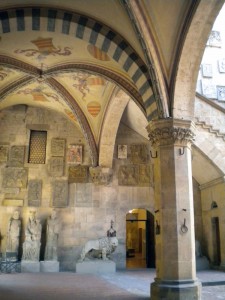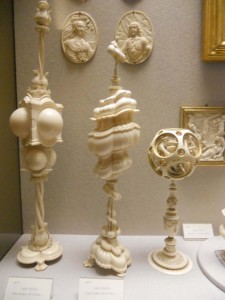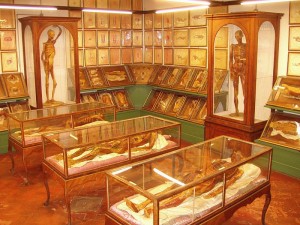Florence: Overview of Major Museums
Kicking off my new Travel Reviews section, a quick review of some centerpieces among the many, many, many attractions Florence offers her visitors. Please keep in mind that times and prices change constantly, so always check before you plan:
Uffizi Gallery: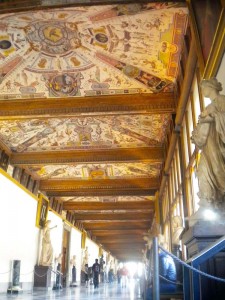
- The city’s great painting collection, housed in the offices built by Vasari for the Medici dukes. Arranged in mainly chronological order, the collection chronicles the progression of art out of the middle ages through the Renaissance. This is where you find the big names: Giotto, Filippo Lippi, Botticelli, Raphael, Titian, Michelangelo, all in halls decorated with Romanesque grotesque ceilings, covered with portraits of everyone who was anyone in the Renaissance, and crammed with classical sculpture, including the Medici copy of the Laocoon. Highlights include the three big Madonnas, the Botticelli room featuring the Madonna della Magnificat and the Birth of Venus, Raphael’s portraits of popes Leo X and Julius II, and Michelangelo’s Holy Family With Gratuitous Naked Men. Endless gift shop including a huge room of academic books. Fantastic venue for Spot the Saint.
- Cost: 11 euros plus 3 or so extra for making a reservation.
- Time required: 6+ hours if you can stand up that long.
- Hours: 8:15 am to 6:50 pm Tuesday through Sunday. Closed Monday. Sometimes open late Tuesdays.
- Website: http://www.uffizi.firenze.it/en/index.php
- Notes: The Uffizi has an infinite (3+ hour) line during peak season, so it’s a very good idea to make a reservation. It also has very few places to sit, no water fountains (they scan your bag as you go in so you can’t bring water), and a very inconveniently-located bathroom. So enormous and exhausting is it that it’s very difficult to go through in one day. If you’re in Florence for a week, I highly recommend getting a Friends of the Uffizi pass, which costs 60 euros at present (40 for student-age) and gives you unlimited access plus line skipping at the Uffizi and the Pitti Palace. The card, which can be purchased at an office at the Uffizi, gives you the leisure to go to the Uffizi for half a day, then go do something else, then return. In my experience a typical visitor does not quite get 60 euros out of the pass in a single week, but it comes close, and the convenience makes up the difference.
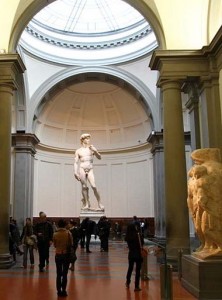 Accademia:
Accademia:
- The other most famous and frequently-visited museum in the city. The Accademia hosts the original Michelangelo David and Michelangelo Prisoners, plus a great collection of Renaissance paintings, and, in the upper floor, a great Saint Spotting area including a huge collection of icons of Saint Zenobius. Michelangelo’s fame means the Accademia is always extremely crowded, and there are always mobs around the David.
- Cost: also 11-ish, 14-ish with an appointment.
- Time required: 5+ hours
- Hours: 8:15 am to 6:50 pm, Tuesday through Sunday.
- Website: http://www.polomuseale.firenze.it/musei/?m=accademia
- Notes: The Accademia is great, but it’s also a lot of hassle and chaos, especially during peak season, and it’s not actually that much better than most of Florence’s other, less popular great museums. As with the Uffizi, make an appointment, but honestly, if you are only in Florence briefly and need to choose carefully, there are other things you can see that are just as fabulous and a lot less difficult.
Bargello:
- Formerly the prison and seat of the city’s chief of police, the Bargello is a fabulous fortress, with battlements and hundreds of coats of arms of knights who served in it. Now it houses the city’s Renaissance sculpture collection, including Donatello’s David and Cellini’s Ganymede. Easy to reach and inexpensive, this little museum takes a comfortable half-day to see thoroughly, but is crammed with world-class pieces. Also contains collections of ceramics, a chapel whose fresco includes the oldest surviving portrait of Dante, and assorted “stuff” ranging from Roman cameos to an ivory and ebony medieval portable backgammon set.
- Cost: 8 euros
- Time required: 3-4 hours.
- Hours: (sigh) 8:15 AM to 1:50 PM, closed the 2nd & 4th Monday and 1st, 3rd & 5th Sunday of each month and randomly selected holidays.
- Website: (the official one seems to be down) http://en.wikipedia.org/wiki/Bargello
Palazzo Pitti:
- This enormous palace in the across-the-river (Altrarno) area is where the Medici dukes moved once the Palazzo Vecchio proved too cramped for their royal style. It contains seven museums in one, which are confusingly grouped into two separate tickets. They are constantly rearranging what is on what ticket, so this info may be out of date:
- Ticket 1 is for the Palatine Gallery, which includes yet another collection of extraordinary paintings, including a lovely Raphael holy family, a great Filippino Lippi madonna, Titian’s extremely sensual Mary Magdalene, and elaborate baroque frescoed walls and ceilings. It also contains some of the finest examples of Pietra Dura, the Florentine art of making elaborate images out of inlaid semi-precious stone. It also includes the Royal Apartments, with all the fancy furniture.
- Ticket 2 is for the Argenti Museum, or silver museum, which houses the ridiculous treasures which belonged to the Medici family. When I say ridiculous I mean it, and the endless cases of ivory vases, gilded cups, huge amber reliquaries and elaborate hand-carved rock crystal dishes leaves one completely overwhelmed by the opulence of wealth. Prepare to be stupefied by the sheer genius of human opulence. This collection is very different from anything you meet at a typical museum, and I recommend it highly as a break from too much art. The first few rooms also feature truly astounding fake-perspective frescoes, and one of my favorite fresco cycles of all time, depicting Lorenzo de Medici inventing the Renaissance. There are also frequently interesting temporary exhibits in the initial rooms.
- Also on Ticket 2 are the Boboli Gardens, the large, meandering Italian gardens behind the palace. These are great for a quick stroll, or for getting really winded on the endless slopes and stairs. At the river end of the gardens is the grotto, an elaborate Renaissance fantasy of a fake excavated ancient Roman villa, covered with fake mud and fake ruins and rustic mosaics made of seashells. It is only open for brief intervals at unpredictable times of day, so if you go, ask an employee when it will be open that day, to make sure you don’t miss it.
- Minor museums included in one ticket or another are the Modern Art gallery, the Costume Museum (disappointingly small and modern), the Porcelain Museum, and the Carriage Museum.
- Cost: 8.5 euros for the Palatine, 7 for the Argenti. Or free with the Friends of the Uffizi xard.
- Time required: 3-4 hours for the Argenti, another 3-4 for the Palatine, 1-2 each for the others.
- Hours: 8:15 to 6:50, closed Mondays.
- Website: For the Argenti: http://www.polomuseale.firenze.it/en/musei/?m=argenti, For the Palatine: http://www.polomuseale.firenze.it/en/musei/?m=palatina
Museum of the History of Science (Museo Galileo):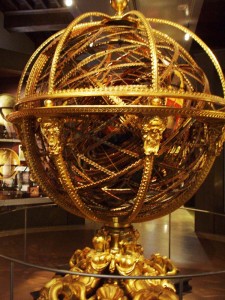
- A phenomenal collection of scientific instruments from the Renaissance through 19th century, though mostly 17th and 18th. Astrolabes, sextants, orreries, clocks, barometers, telescopes, electrostatic generators… These are pieces from the period when scientific demonstration models were designed to impress aristocratic patrons, so gold and engraving are the norm. Highlights include Galileo’s telescopes (and finger and thumb in a reliquary), apothecary’s work table, the Military Compass (dagger with built-in compass and other mathematical tools), and a gruesome collection of 18th century full color obstetric models showing dissected female torsos and the various ways babies can be laid wrong in them.
- Cost: 8 euros.
- Time required: 3-4 hours.
- Hours: 9:30 AM – 6:00 PM, except on Tuesdays, when it closes at 1:00 PM.
- Website: http://www.museogalileo.it/en/index.html
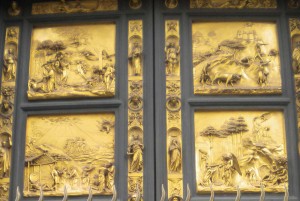 Museo del Opera del Duomo (Museum of the Cathedral Corporation):
Museo del Opera del Duomo (Museum of the Cathedral Corporation):
- The construction of Florence’s massive cathedral, which was, at the time, the most spectacular church in Christendom, was an incredibly expensive undertaking, and the Renaissance corporation created to oversee it survives to this day. This museum showcases the art and artifacts which belong to that corporation, including numerous sculptures from the old early Renaissance facade which was later torn down in favor of a more modern one, the wooden models of different designs for the church, and many of the tools used for it. Highlights include Donatello’s stunning wooden sculpture if Mary Magdalene, the reliquary from the Baptistery containing the right index finger of John the Baptist, and the original Baptistery sculptures and (once they’re done cleaning them) the real Gates of Paradise.
- Cost: 6 euros
- Time required: 2-3 hours.
- Hours: 9:00 AM – 7:00 PM, except on Sundays, when it closes at 1:45 PM.
- Website: http://www.operaduomo.firenze.it/ There does not seem to be an English version of this website.
Palazzo Strozzi: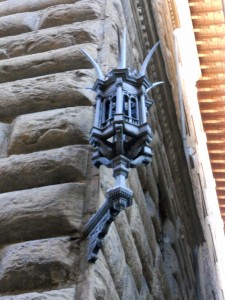
- An enormous city palace built by one of Florence’s leading merchant families, the Palazzo Strozzi hosts a circuit of temporary exhibits, usually pretty good, but each is unique, so check it each time you consider coming. The Strozzi family were never the most powerful, but generally the biggest wealthy merchant family, with the most individual households, so widely feared (and often exiled) by the Medici and other rivals. This palace was built after a return from exile, and celebrates their presence in the city.
- Cost: Variable by exhibition and greed.
- Time required: 2-4 hours depending on exhibit.
- Hours: 9:00 AM – 8:00 PM, Thursdays 9:00 AM – 11:00 PM.
- Website: http://www.palazzostrozzi.org/index.jsp?idProgetto=2&idLinguaSito=2
La Specola (Museo di Storia Naturale):
- All major cities have natural history museums, but not ones founded by the Medici. La Specola hosts eighteenth-century specimen collections, including skeletons and dissection models, many many more elaborate wax surgical models than the science museum, and the Medici’s pet hippo (stuffed). Not for those with weak stomachs.
- Cost: 6 euros, 10 euros for museum and exhibition.
- Time required: 2-4 hours.
- Hours: 9:30 AM – 4:30 PM, closed Mondays.
- Website: http://www.msn.unifi.it/mdswitch.html
- Notes: Some ticketing connection with Pitti Palace which I don’t quite understand. (Quoth the website in two contiguous lines: disabled access: YES / disabled access: NO)
Read about Florence’s Churches and Monuments.
3 Responses to “Florence: Overview of Major Museums”
-
I think I actually did get my 60 Euros worth out of my Friends of the Uffizi pass, just about, and the young people definitely more than got 40 Euros worth. As you note it’s worth it anyway to avoid the lines, and it’s also worth it to support their mission statement of preserving civilization and opposing barbarity. That’s surely worth 60 euros even if one never gets to Florence at all.
-
I believe that should be Accademia with two c’s?!
-
Thanks, fixed. Also updated the now obsolete info on the Friends of the Uffizi card, which now only lets you into the Uffizi and the Pitti, but is still totally worth it.
-

